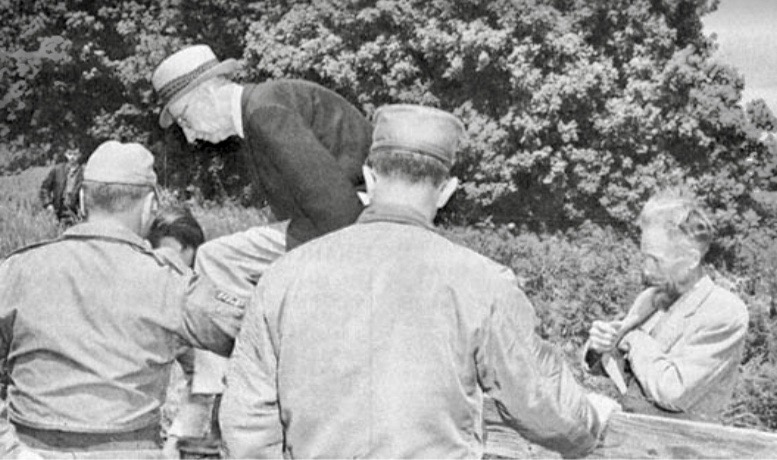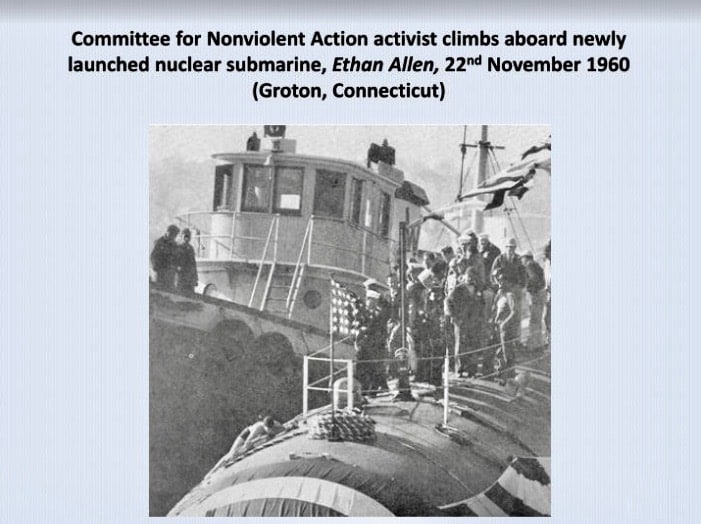Jerry Elmer: On the fiftieth anniversary of the Minutemen attack
Today, August 24, 2018, marks the fiftieth anniversary of an armed attack by a far right-wing group called the Minutemen on the Committee for Nonviolent Action (CNVA) Farm in Voluntown, Connecticut. Seven people were shot during the Minuteman assault, none fatally. I was at the Farm at the time of the attack (I was not shot), and later served for
August 24, 2018, 6:00 am
By Jerry H Elmer
Today, August 24, 2018, marks the fiftieth anniversary of an armed attack by a far right-wing group called the Minutemen on the Committee for Nonviolent Action (CNVA) Farm in Voluntown, Connecticut. Seven people were shot during the Minuteman assault, none fatally. I was at the Farm at the time of the attack (I was not shot), and later served for some years on the CNVA Board. Though the Minuteman attack has today been all but forgotten, it was big news at the time.
A word of background is in order.
The national Committee for Nonviolent Action was formed in 1957 as the direct-action wing of the pacifist movement in the United States. In the 1950s, national CNVA organized a number of nonviolent civil disobedience projects to protest nuclear weapons.
For example, in 1958, Bert Bigelow and three others were arrested sailing their ketch, The Golden Rule, into the Pacific test area where the United States detonated nuclear weapons; this was a protest against the development and testing of nuclear weapons. The story of the Golden Rule protest is a fascinating one, with important implications for today, and I have written about that elsewhere.
In 1959, national CNVA organized another civil disobedience action in which demonstrators protested against nuclear weapons by trespassing on an Air Force ICBM base near Omaha, Nebraska. There is a famous photograph of the then-elderly pacifist leader AJ Muste climbing over a fence to get onto the Air Force base.

New England CNVA, which was an outgrowth of and part of national CNVA, started as “Polaris Action” during the summer of 1959, organized by my friend Marj Swann, her husband Bob, and others. Pacifists organized regular pickets and protests at the Groton, Connecticut, factory owned by Electric Boat, where Polaris submarines, that were to carry nuclear missiles, were being manufactured. And when those submarines were commissioned and launched at the Navy Yard in Groton, pacifists formed armadas of small canoes and rowboats to symbolically blockade the newly launched submarines. In 1960, a pacifist activist bought the Farm in Voluntown for CNVA to use as their headquarters.

The late 1950s and early 1960s were the height of the cold war, and tension between the pacifists at CNVA and the local community was high. Some of the animosity we got from the community was understandable: if the pacifists at CNVA had our way, the United States would stop making nuclear weapons; the workers at Electric Boat could lose their jobs. Indeed, when CNVA members picketed or handed out leaflets to workers at Electric Boat the most frequent retort we heard had to do with jobs. The refrain that we CNVA members heard endlessly was this: Building submarines to deliver nuclear warheads (and potentially kill tens of millions of people) created good, well-paying jobs.
The CNVA Farm was a combination of a commune where one or two dozen CNVA members lived and a political headquarters from which CNVA’s work was organized and carried out. Local teenagers often came to the Farm to harass the pacifists. In 1966, a barn on the property was burned by arson. (The crime was never solved.)
On the morning of Saturday, August 24, 1968, I was sleeping on the second floor of the old farmhouse when I was awakened by a sound that I mistakenly thought was firecrackers being set off. But as I descended the stairs to the first floor, I saw a man with a rifle, and I realized that the sound that had awoken me was not firecrackers at all. This is what had happened.
Five heavily armed members of the right-wing Minutemen had attacked the Farm, intending to kill all the pacifists. The Minutemen carried bayonetted rifles, pistols, and knives. Some of the Minutemen had entered the farmhouse with cans of gasoline, planning to burn the building. Others had waited outside the farmhouse with high-powered rifles, intending to shoot the pacifists as we jumped out of the second- and third-floor windows of the burning farmhouse.
However, the FBI had infiltrated the Minutemen, and knew of the attack in advance. The FBI had tipped off the State Police who, unbeknownst to us, had surrounded the Farmhouse in an effort to prevent the Minuteman attack. Neither the FBI nor the state police had told CNVA of the attack, believing, probably correctly, that we pacifists would have tried to put our nonviolent principles to work by contacting the Minutemen and trying to reason with them.
No one knows how the Minutemen slipped through the perimeter of police officers that night, but they did. They found two CNVA staffers on watch on the first floor, Mary Suzuki Lyttle and Bobbie Trask. The Minutemen blindfolded, bound and gagged the two women. Meanwhile, the State Police, realized that the Minutemen had gotten through their stakeout, so chased into the farmhouse after the Minutemen.
A shootout ensured, during which seven people were wounded. Mary and Bobbie – bound, gagged, and blindfolded – were directly between the police and the Minutemen during the shootout. Four Minutemen were shot by the police before they surrendered; two police officers were also wounded. Bobbie was shot in the leg in the crossfire.
CNVA doesn’t exist anymore. In 1968, the national organization merged into the older War Resisters League (which had been founded in 1923). New England CNVA continued until the early 1980s, and then fizzled. The Minutemen, too, have long since ceased to exist.
But I was reminded this summer of the argument we heard endlessly 50 years ago about good jobs. On July 19, the Rhode Island Energy Facility Siting Board heard the first witnesses in the long-running case that will determine whether Invenergy will get to pave over a forest in Burrillville, Rhode Island, in order to build a brand, spanking new 1,000-megawatt fossil-fuel power plant – which, if built, would produce millions of pounds of carbon emissions a year for decades. The first two witnesses were Ryan Hardy for Invenergy and Michael Sabatoni for the Laborers’ Union. Their argument had a very, very familiar ring to me: Building the carbon-belching Invenergy power plant would create lots of good jobs. And Hardy and Sabatoni were, of course, correct – in exactly the same way that the EB workers in Groton were correct 50 years ago.
The Minuteman raid on the CNVA Farm was very frightening, but it was, sadly, not an outlier in American history. Far right-wing extremism has a long history in the United States. This includes many official governmental actions such as the judicial lynching of the four Haymarket martyrs on November 11, 1887; the Palmer raids of 1919-1920 that victimized thousands (including Emma Goldman and her political comrade and some-time lover Alexander (Sasha) Berkman); and the McCarthy witch-hunts of the 1950s.
And far right-wing extremism in the United States also includes the work of non-governmental organizations. According to the Southern Poverty Law Center, the number of armed right-wing militia groups in the United States shot up by over 50 percent in the year following Trump’s election from 26 such groups in 2016 to 40 groups in 2017. And, as we saw in the aftermath of the August 2017 Charlottesville protests, today far-right-wing extremism is gaining support from the highest levels of the United States government.
In this context, the Minuteman attack on the CNVA Farm 50 years ago today is but a single example of a much, much longer history that continues until the present day. And, to a long-time political activist, the jobs argument then (applied to nuclear weapons) is strikingly similar to the jobs argument today (applied to the fossil-fuel industry writ large).


